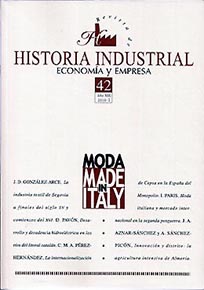Guilds against the construction of the free market. The textile industry in Segovia at the end of the 15th century and the beginning of the 16th century
Keywords:
Textile Industry, Guilds, Verlagssytem, Free MarketAbstract
In the mid-fifteenth century, Segovia saw the rise of businessmen who organized wholesale textile production according to formulas approaching verlagssystem and manufacturing. Local guilds were opposed to this, and were unwilling to implement a concentrated manufacturing system that would deprive them of control over labor and productive markets. Out of this arose, at the end of the century, clashes between the two sides in the form of lawsuits and appeals to the monarchy to change the legal framework. The result was a partial victory of industrial capital against the guilds in which concentrated production was maintained while allowing the guilds to keep privileges wich delayed progress towards a free market. This could have been a cause of the lesser development of Spanish industry in the context of preindustrial Europe, above all from the end of the 16th century.Downloads
Published
How to Cite
Issue
Section
License
The author assigns all rights to the publisher. Creative Commons
The author who publishes in this journal agrees to the following terms:
- The author assigns all intellectual property rights exclusively to the publisher for the entire duration of the applicable intellectual property rights.
- The publisher will distribute the texts under the Creative Commons Attribution License, which allows others to share the work, provided that they acknowledge the authorship, its initial publication in this journal, and the conditions of the license.





